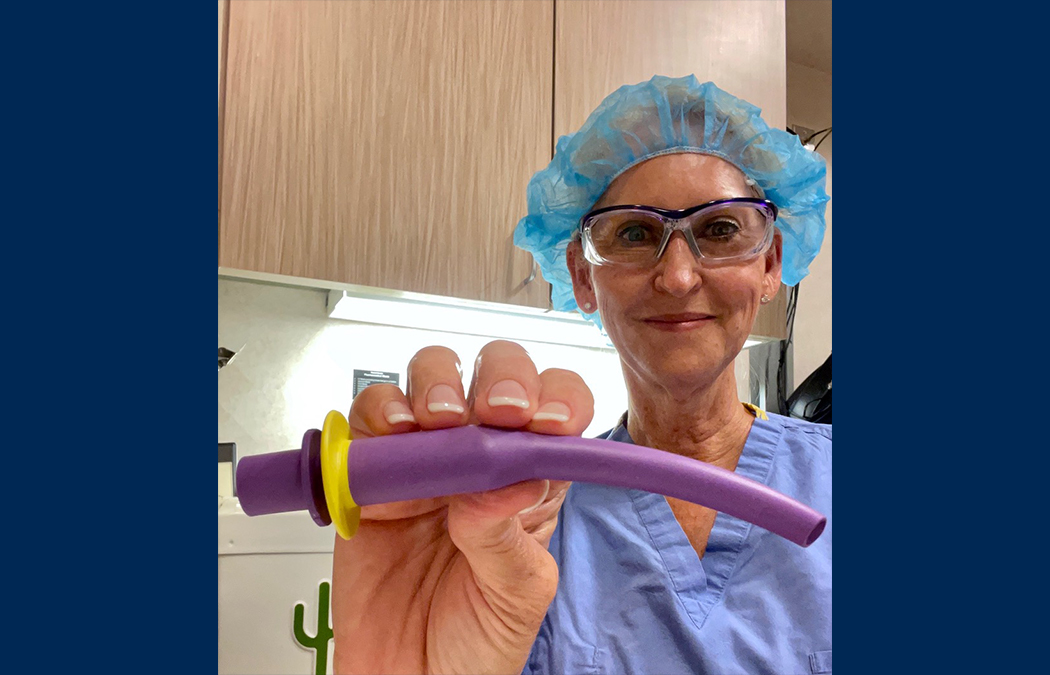Dr. Roxanne McMurray M’93, a nurse anesthetist by trade, never planned on starting a medical device company.
“I never set out to be an entrepreneur,” she said. “I am very content providing anesthesia.”
But, as they say, necessity is the mother of invention. After years of frustration with ventilation equipment used to help patients breathe, McMurray knew something new and innovative was needed in the field. This led to the invention of the McMurray Enhanced Airway and the foundation of McMurray Medical, the company she now runs with her husband and three other investors.
“With liability going up, not having devices that adapt to meet patient needs, and having to do workarounds to keep patient’s airways open, I noticed, ‘We need a device to open the distal pharyngeal tissue and keep patients breathing.” The tools created centuries ago did not work as well as they once did.
So, in 2016, McMurray and her business partners set out to design the McMurray Enhanced Airway. They oversaw the development of a number of prototypes and eventually were able to find a manufacturer for the device. In 2019, they officially launched the product.
The company is now on its third production run and is experiencing success. The device is being used in 49 states and is used in major healthcare systems. According to McMurray, most of the connections the company has made have been through word-of-mouth advertising.
“We’re a bootstrap company,” she said.
And the device is being used beyond just the administration of anesthesia. In 2021, the McMurray Enhanced Airway received the EMS (emergency medical services) Innovation of the Year Award.
“The beauty of the device is that it is easy to use, it’s a multi-purpose tool, and it’s a simple, smarter, not harder device,” she said.
McMurray’s ability to create this groundbreaking medical device comes from years of experience in the field, along with advanced nursing education, which includes a Master in Nurse Anesthesia degree from Saint Mary’s, as well as a Doctor of Nursing Practice degree.
Prior to attending Saint Mary’s, McMurray had been working as a critical care nurse. Wanting to attain an advanced practice degree, she began weighing her options.
“Every nurse anesthetist I talked to loved their career,” she said. “I also enjoyed one-on-one critical patient care, and being a nurse anesthetist is a good step towards having increased autonomy with critical patients.”
What impressed McMurray about Saint Mary’s program was the focus on particular body systems during clinical practices.
“We would do six weeks of the nervous system and then six weeks of the cardiac system, instead of a hodgepodge where you might say, ‘Oh, I’ll focus on this system today and this system tomorrow,’ ” she said.
She added that clinical placements during her time in the program were top-notch. “There were always excellent practitioners at all of our clinical sites who provided stimulating learning,” she said.
Now nearly 20 years after her time at Saint Mary’s, McMurray says the education she received during her master’s program has helped her as she leads at McMurray Medical.
“Nurse anesthetists are leaders,” she said. “We’re taught to continuously improve our career, and we’re always wanting to do our best. In each scenario we’re in, we’re passionate about patient care and making sure we have the best devices possible to provide that care. And Saint Mary’s helped me develop that concept of doing your best and going beyond what is expected of you.”

